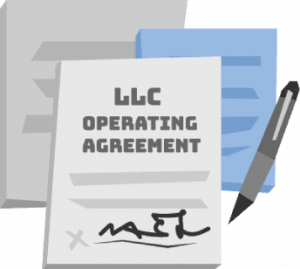How to Start an LLC in New Jersey
There are three primary steps if you’re looking to start an LLC in New Jersey: name your LLC, get a registered agent, and file the necessary formation paperwork plus a $125 state filing fee. But if you want to fully protect your assets with an LLC and keep your LLC in good operational shape—and out of legal trouble—you’ll have to go beyond those basic steps.
Below, we’ll fill you in on requirements for starting an LLC in New Jersey, as well as what to do after your LLC is formed. Do you already have an LLC registered in another state or country? Then you may want to register a foreign LLC in New Jersey instead.

1. Name Your LLC
Your first priority is naming your LLC. New Jersey’s complete rules for naming an LLC can be found in NJ Rev Stat 42 § 2C-8. Your LLC’s name must:
- Include a designator like limited liability company, L.L.C., or LLC
- Be unique among registered business names in New Jersey
- Not include any words restricted by law in New Jersey
If you’ve already thought of a business name, check to see if it’s available. If you’re not quite ready to form the LLC yet, you can file a business name reservation online or by mail.
New Jersey only allows out-of-state businesses to use doing business as (DBA) names. In-state businesses who want to use a name other than what’s on their LLC’s paperwork must instead register for an alternate name by submitting form C-150G to the New Jersey Division of Revenue. It costs $50 to file.
Yes. A domain name is your a web address online that connects to a website. While it is not required that you register your domain name or have a domain name for your business, securing one early is a smart move. When you register a domain for your company, you get a professional email that matches your business name and access to building a business website.
When Northwest forms your LLC, we help you register your domain name in less than 10 minutes and provide you with a pre-built website based on your specifications and brand design. Don’t need a website yet? No worries! You can still use your domain name to set up your business’s email accounts.

2. Designate a Registered Agent
Your New Jersey registered agent is responsible for accepting important legal mail (called service of process) on your LLC’s behalf and getting it to you quickly. A registered agent must have a physical address in New Jersey and be willing to list that address on your LLC formation documents.
You’re legally required to appoint a registered agent in New Jersey. In fact, you won’t be able to complete your formation paperwork before you have a registered agent.
Learn why the pros use a registered agent service.
You can act as your own registered agent as long as you’re okay with 1) having your address on the public record and 2) maintaining regular business hours at this address.

3. Submit LLC Public Records Filing
Per New Jersey state LLC statutes, to legally form your LLC, you have to file a Public Records Filing for New Business Entity to the New Jersey Division of Revenue. Corporations and limited partnerships also use this form, so you don’t have to fill out every single field. Submit the form online, by mail, or by fax.
To fill out the form, you’ll need to provide the following information about your LLC:
- Company name. Include an indicator like LLC.
- Type of entity. For a domestic LLC, enter LLC.
- Business purpose. Keep it brief. For example: deli or bookstore. Or you can add something generic like: performing lawful business in New Jersey.
- Duration. If relevant, add a date for your LLC to automatically dissolve. Most LLCs skip this field.
- Registered agent. This is someone designated to accept service of process on behalf of your LLC.
- Registered office. This must be a physical address in New Jersey where your registered agent is present during office hours.
- Main business address. This address can be outside of New Jersey and does not have to be a physical address.
- Signature. Anyone authorized to do business on behalf of your LLC may sign, including your registered agent.
Note: All of the information on this form will become part of the public record.
If you file online, the state will process your application within 1-2 days of receiving it. If you file by mail or fax and don’t pay extra for expedited service, it could take up to nine weeks to process your LLC’s paperwork.
The costs to form a New Jersey LLC start at $125 to submit a Public Records Filing for New Business Entity to the New Jersey Division of Revenue. There are more fees you’ll need to take into consideration, however.
You can file your LLC formation paperwork online in New Jersey.
Your name and address becomes part of the record when you list it on your LLC formation paperwork. This is annoying because it makes it easier for marketers to target you with junk mail. To avoid that, hire a registered agent company like Northwest. We put our information on the form wherever we can, helping you keep your private information protected.
Fast Local
NJ LLC Registration

Your New Jersey LLC is Formed. What's Next?

Write an LLC Operating Agreement
An operating agreement is an internal document that describes the ins and outs of how your business will be run. It should go into almost painful detail about everything from how voting works to how the LLC handles disputes. Even if you’re the only member of an LLC, you still need an operating agreement to do things like open bank accounts.
An operating agreement is a complex document. Check out our New Jersey operating agreement we had our attorneys draft up for you.
No, New Jersey law does not require any sort of operating agreement. But you still need to make one, because an operating agreement is a legally binding document that details how your LLC will handle everything from membership transfers to allocating profits and losses.
You should also put your operating agreement in writing. A written operating agreement holds up better if you find yourself involved in a court dispute with, say, another member of your LLC.
You can tailor your operating agreement to your LLC’s needs, but at minimum, the document should cover the following:
- Profits, losses, and distributions
- Initial investments
- Voting rights and decision-making powers
- Transfer of membership interest
- Dissolving the business
You’ll also want to include the structure and management type for your LLC in your operating agreement. There are many types of LLC structures and formations from single member to multi-member and so many more.

Get a New Jersey Virtual Office
If your limited liability company in New Jersey doesn’t have a main base of operations, a virtual office allows you to get a New Jersey address for your business that you can use for correspondence and legitimizing your company. With Northwest, we offer New Jersey Virtual Office Service for $29 a month. With Northwest, we offer two mail forwarding options as well. You can choose from: same-day digital scanning and weekly physical mail forwarding—whichever best suits your needs.
A virtual office is a real location, staffed by real people. It gives you all the benefits of a physical office like having a phone number dedicated to your business with a real address you can use for your business when applicable. Our New Jersey Virtual Office Service gives business owners the benefits without the hassle.

Get an EIN, Bank Account & Funding
Your LLC can’t operate without money, so it needs a bank account. Establishing a business bank account draws a clear line between your personal accounts and your LLC. You’ll need get an EIN before opening a business bank account.
Once the account is formed, you should fund the LLC. To open a Bank account for LLCs, every member should make an initial contribution that’s equivalent to their membership interest, aka the percentage of the LLC they own.
Yes, especially if you have employees. But even if you don’t have employees and will be running a single-member LLC, you’ll need an EIN to open a bank account for your business. Giving out your EIN is also more secure than listing your Social Security number.
You can hire us to get your EIN as part of your LLC formation package.
No, an EIN is issued by the IRS, while the State of New Jersey issues NJ entity IDs. However, the NJ entity ID will start with the same numbers as your EIN, plus three additional numbers at the end.

File Taxes & Reports
In New Jersey, your LLC will have certain tax and reporting requirements to meet. Here’s how it works:
- New Jersey taxes: An LLC’s default tax status is pass-through entity, which means the profits pass through the LLC and get distributed to the members. Those members then have to report the profits on their personal tax filings. LLCs at the federal level must pay a 15.3% self-employment tax rate in New Jersey.
- New Jersey Annual Reports: Your New Jersey Annual Report is due at the end of your LLC’s anniversary month. So if you formed your LLC on May 14, your annual report would be due by May 31 the next year (and every subsequent year). It costs $75 to file a New Jersey Annual Report, and the filing must be submitted online. We can also file your annual report for you.
- New Jersey business license: You’ll want to check with your local county clerk to see if your LLC will need any licenses. New Jersey, however, does not require a state general license.
- BOI Reports: The Beneficial Ownership Information (BOI) Report is a new federal filing for international businesses registered to do business in the U.S. Business owners file their Report with the Financial Crimes Enforcement Network (FinCEN). The BOI Report requirement is currently under review, but the deadline for new international businesses is 30 days from their U.S. registration date.
LLCs are taxed as pass-through entities by default in New Jersey. As an alternative, they can file paperwork with the IRS to be taxed as an S-corp or a C-corp.
Yes, LLCs must file an annual report with the New Jersey Secretary of State. The main purpose of filing an annual report is to make sure the state has up-to-date contact information for your LLC.
The State of New Jersey can dissolve your business for failing to file an annual report.
The BOI Report can be filed online using the BOI E-Filing System. Filing the report is free. If any information listed on the BOI Report changes, you should file an updated report within 30 days. Filing an update is also free. To hire us to file your BOI Report for you, you’ll need to sign up for a free account or hire us to form your company or act as your registered agent.
U.S. citizens and businesses that originally formed in the U.S. do not need to update their BOI Reports or their beneficial owner information if they’ve filed their Reports before the March 3 lift of enforcement by FinCEN.
*This is informational commentary, not advice. This information is intended strictly for informational purposes and does not constitute legal advice or a substitute for legal counsel. This information is not intended to create, nor does your receipt, viewing, or use of it constitute, an attorney-client relationship. More information is available in our Terms of Service.
Ready to Start an LLC in New Jersey?

